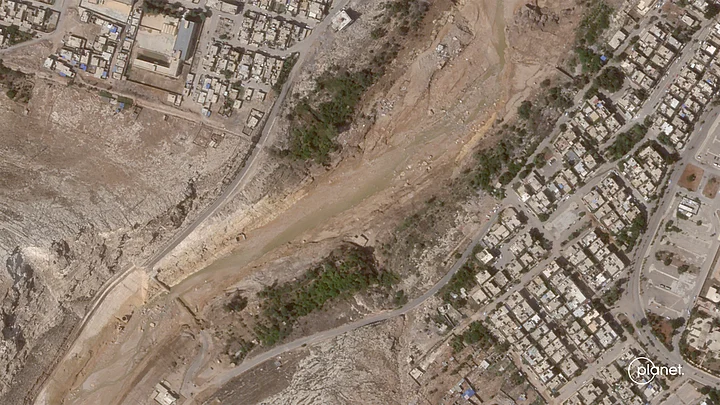Last week, devastating floods in the city of Derna, Libya caught our attention. Waters from two ripped dams that were meant to protect the city, swept away people sleeping in their homes. More than 20,000 lives are reported to be lost.
Floods in this part of the country were surely unprecedented but not entirely unexpected. Libya is among the few hotspots in the Mediterranean that is warming 20% faster than the global average.
Higher temperatures in the area have led to warming of the Mediterranean Sea. Warmer waters further supercharged wind streams, as Cyclone Daniel moved across Turkey, Greece, and Bulgaria. Little did anyone realise that it would dump 440 mm of rainfall in just a few hours.
The cause of the disaster, however, was not merely excess rain. It was the lack of preparedness for such a hazardous event. Despite existing knowledge of climate risks, a poor governance structure was apparent in the way the disaster unfolded.
Timely Warning Would Have Limited Catastrophic Effect
The World Meteorological Organization (WMO) has pointed to a non-functional early warning system that could not caution people in time, hence, no evacuation took place. Further, poor maintenance and neglect of the two dams upstream of the dry riverbed that ran through the town, cascaded the impact of the disaster.
In India, we have learnt lessons from similar experiences the hard way. In the late nineties, a cyclone on the West coast of Gujarat claimed 4000 lives. The cyclone exposed a big gap in the early warning system of the country as people were caught unawares. A year later, a super cyclone hit Odisha claiming over 10,000 lives.
Since then, India has invested heavily on improving its forecasting and early warning capability. The Indian Meteorological Department has acquired state of art capabilities to be able to provide accurate forecasts both in terms of time and location of cyclone landfalls. This coupled with high level of awareness and training on the ground to respond to such warnings have helped in suitable preparedness measures. Community level awareness and measures carried out in partnership with local volunteers and civil society organisations, have contributed to a coordinated and timely interpretation of warnings even when the lead times are short as in the case of Libya.
Local governments have adopted a 'zero-casualty’ approach ensuring all public agencies directly or indirectly impacted by a potential hazard have well-defined protocols in place to avert losses.
The most recent Cyclone Biparjoy that hit the coast of Gujarat two months ago caused minimum life loss (16 casualties) and normal activity could resume within a few days. These are successful practices that are people-based, low-cost yet effective, and hence, replicable in other developing countries that face similar threats.
Innovative Disaster Management Measures Are the Need of the Hour
In the next few years, global temperatures will rise further – with the warming of the oceans, cyclone activity will increase, and hot air will absorb more moisture, creating shifts in wind streams.
This would imply new areas getting hit by cyclones and more frequent incidents of intense rainfall. Areas that traditionally remained dry, like Derna town, will now be experiencing flood-type disasters recurrently.
This is already being experienced among many coastal regions around the world.
Conventional methods of preparedness for disaster events have proven to be redundant in these changed circumstances. We would need much more agile systems in place, leveraging technology and training that enable governments to move faster and more effectively to be able to save lives and assets before the onset of hazardous events.
At this time, while survivors of Derna town need humanity’s assistance and assurance, it is upon us to learn from such incidents to ensure that people of Derna don’t face such tragedies in the future and no such community anywhere in the world is a victim of a systems failure of the kind we witnessed in Derna. We can still prevent hazards from becoming an 'unnatural disaster.’
(Manu Gupta is the Co-founder of SEEDS (Sustainable Environment and Ecological Development Society). This is an opinion piece. The views expressed above are the author’s own. The Quint neither endorses nor is responsible for them.)
